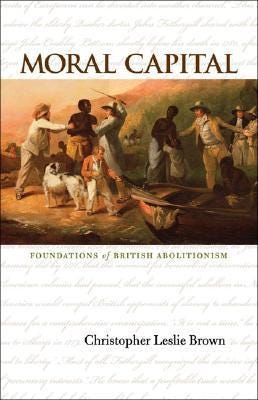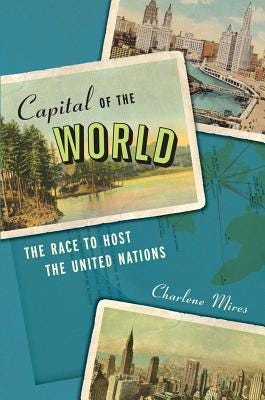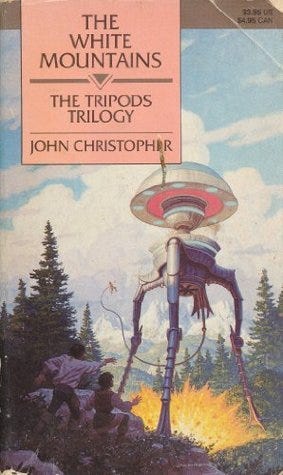Short Reviews for March 2025
Moral Capital, Capital of the World, White Mountains, This Virtual Night
Moral Capital: Foundations of British Abolitionism by Christopher Leslie Brown (496 pp; 2006)
Who should read this? People interested in the circumstances around positive shifts in public mindset, or the start of world-changing mass movements.
This's a history of the start of abolitionist thought in Britain up through the 1780's. It impressed me with how much had to come into place before a real abolitionist movement could start. Before any prominent abolitionist movement, most politically-active people had already come to define Englishness around liberty, and come to see their empire as having some role in doing good in the world. This wasn't thanks to any organized movement, unless you count the Glorious Revolution or Anglican Church as a movement.
Into this fertile background, then, slavery came as a political issue during the leadup to the American Revolution: being used as an analogy that everyone could agree was bad.
So, after this - when Quakers and Methodists decided the abolition of slavery was a cause worth fighting for, they were fighting on good ground for an offensive. They hadn't brought this about; it had been done for them. Brown doesn't venture this, but it's clear to me the way had been prepared by God.
Without this - perhaps there would have been other causes for them to fight in. There had been earlier would-be abolitionists whose tracts sank unread or even unpublished. Most of them spent their time on other causes instead, many of them good causes. God's Spirit directs as He wills. But I wouldn't have criticized anyone who fought against slavery anyway. Some did fight to evangelize the slaves, and they did good work - if not among the slaves, then in providing case-studies for later abolitionists in how bad slavery could be.
Capital of the World: The Race to Host the United Nations, by Charlene Mires (320 pp; 2013)
Who should read this? People who want a picture of the public view of the United Nations in 1945
This's the story of the United Nations' picking a site for its headquarters, and cities' competition to be that site - to be what many people at the time imagined would become the capital of the world. Early on, it was announced it would be somewhere in North America, and then cities from Detroit to New York to Claremore, Oklahoma, competed to be that somewhere.
But the end decision wasn't thanks to them. The diplomats in the UN decided on New York based mostly on their prejudices and comfort, and also on Rockefeller donating the eventual headquarters site.
So, the story arc in this book is very anticlimactic: almost none of the cities' posturing and advertising mattered. The telling is also somewhat scattered, because it's telling about myriads of campaigns and incidents that didn't build on each other.
I'd recommend this book only as a snapshot of this moment in history - at the end of World War II - when small-town America first saw itself as part of the global stage, when it seriously thought a capital for the world was in the offing, and when it seriously considered itself a possible place for that capital. But that snapshot is a very significant something - both for interpreting Golden Age sci-fi, and for understanding the American mindset and the American story.
The White Mountains, by John Christopher (195 pp; 1967)
Who should read this? People who like a kids' adventure story framed around the ideal of freedom, or people who like an ominous alien-invasion story gradually unveiled.
I enjoyed this tale as a kid; I enjoyed it again now.
Our story opens in a world long ago conquered by the alien invaders, who've mind-controlled every adult human to contentedly submit to them. But, they can't practicably do it to kids... so our protagonists are kids escaping to a rumored resistance group in the Alps, determined to live free.
It's a fun adventure story, and an engaging low-tech world which I enjoyed in one way as a kid and another way (with growing ominousness at how the aliens have forced that low tech) as an adult. Christopher has certainly set up a good premise for kids to be adventuring on their own, treating every grown-up as the enemy! And then he sets freedom against comfort nicely in our protagonist's mind as a brief resting-stop lets him seriously question whether he wants to continue the escape. It's not a deep story (even though deep stories could definitely be told in this world!) but a story I enjoyed.
Also, I like the ominously-hinted backstory here much more than the very different backstory Christopher gave when he returned to this world twenty years later for a prequel.
This Virtual Night, by C. S. Friedman (441 pp; 2020)
Who should read this? People who like good twist-filled sci-fi plots, and people eager for a story exploring the dangers of brain/computer interfaces.
This's Friedman's second book in this universe. It's not a proper sequel - it doesn't continue most of the many open questions left from her previous novel (which I reviewed last month). Instead, it tells its own story - and, again, a very good one. Twists and tension continue from beginning to end.
The premise is, something's wrong with an augmented-reality game that's running on gamers' brain implants. In fact, it caused the gamers to unknowingly endanger their space station's life support. And, one programmer for that game thinks people might be falsely fingering him as responsible - or is there an even deeper conspiracy at work? But that's only the beginning; the conspiracy is much deeper than it seems.
I really how Friedman explores the implications of brain implants and what problems and conflicts they can give rise to. I don't want to say too much for fear of spoilers, but it's very good. And also, I like how - following on her previous book's good picture of computer hacking - she gives a very good picture here of story in computer game design.








I enjoyed Christopher's Tripod trilogy and The Lotus Caves. His teens are normal, rather than emotional wrecks or unnaturally capable, and their adventures have reasonable scope as well. Until the Tripod prequel came out years later, I thought these were HG Wells's War of the Worlds aliens from a successful follow-up invasion.
I'm curious how you, as a religious person, would view the efforts of those who noticed slaves were suffering and responded by evangelizing them, rather than doing anything that would do any good from a secular perspective. I suppose in practice there was a lot of overlap between practical help and evangelizing, but it's hard for me to understand why any effort went to evangelizing.